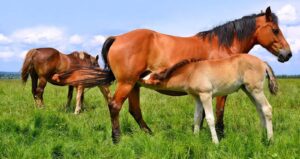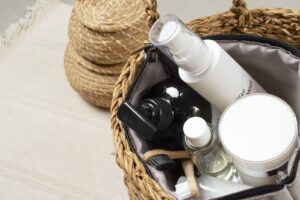The composition of mare’s milk is unique, offering many benefits. It is remarkably similar to breast milk and is a valuable source of vitamins, minerals, and trace elements. It contains high levels of iron and whey protein, which aids absorption and digestion. Additionally, horse milk contains lactoferrin, which supports the immune system.
Composition of horse milk per 100ml:
| Component | Composition |
|---|---|
| General Composition | |
| Water | 91.05 – 91.27% |
| Dry Matter | 9.73 – 9.95% |
| Fats | 0.65 – 1.25% |
| Polyunsaturated Fatty Acids | 18.7 – 25.5% |
| Total Proteins | 1.95 – 2.13% |
| Albumin and Globulin | 0.75% (45% of total proteins) |
| Casein | 1.4% |
| Peptide and Free Amino Acids | 961 ppm |
| Non-protein Nitrogen | 426 ppm |
| Milk Sugar | 6.26 – 6.85% |
| Minerals and Trace Elements | 0.27 – 0.38% |
| Elemental Composition | |
| Calcium | Ca. 1000 ppm (0.13 – 0.5%) |
| Phosphorus | Ca. 536 ppm (0.03 – 0.085%) |
| Magnesium | Ca. 120 ppm (0.004 – 0.014%) |
| Iron | 5.3 – 14.4 ppm |
| Potassium | 484 – 530 ppm |
| Sodium | 116 – 119 ppm |
| Chlorine | 302 – 440 ppm |
| Iron Oxide | 20 ppm |
| Copper | 0.17 – 0.36 ppm |
| Manganese | 0.03 – 0.04 ppm |
| Cobalt | 12.4 – 16.0 ppb |
| Zinc | 181 ppm |
| Silicon | 244 ppm |
| Iodine | 1.9 ppm |
| Selenium | 1 ppm |
| Chromium | 1 ppm |
| Molybdenum | 1 ppm |
| Aluminum | 209 ppm |
| Titanium | 178 ppm |
| Vitamins | |
| Vitamin A | 0.57 – 0.89 ppm |
| Vitamin B1 | 100 – 500 ppb |
| Vitamin B2 | 150 – 650 ppb |
| Vitamin B3 | 85 ppb |
| Vitamin B6 | 300 ppn |
| Vitamin B7 | 1.4 ppb |
| Vitamin B12 | 3.3 ppb |
| Vitamin B13 | 300 m |
| Vitamin C | 98 – 151 ppm |
| Vitamin D | 1.25 ppm |
| Vitamin E | 0.65 – 1.05 ppm |
| Vitamin K | 1.2 ppb |
| Vitamin T (Carnitine) | 1 – 2 mg |
| Others | |
| Pantothenic Acid | 0.25 ppb |
| Folic Acid | 8 ppb |
| Citric Acid | 0.175% |
| Acetylcholine | 1 mg/l |
| Lecithin | 0.109 – 0.25 mg/l |
| Choline | 30 – 40 mg/l |
| Cholesteroline | 94 – 168 ppm |
| Enzymes and Ferments | |
| Peroxidase | N/A |
| Oxidase | N/A |
| Phosphatase | N/A |
| Diatase | N/A |
| Catalase | N/A |
| Lipase | N/A |
| Lysozyme | N/A |
About 40 percent of the protein in horse milk consists of whey protein, almost double the amount in cow’s milk. The higher whey concentration leads to enhanced absorption and digestion compared to dairy products.
Mare’s milk contains about half the quantity of casein compared with cow’s milk. Drinking horse milk that has a lower casein content can provide added comfort for everyone who reacts badly to casein, like allergic reactions and gastrointestinal pain.
Horse milk is known for its high value in vitamins and minerals. It is rich in Vitamin A, B complex, C, E, and D; minerals are also available. Horse milk has a more balanced ratio of calcium to phosphorus than most other types of milk, which allows improved absorption of calcium throughout the body.
Compared with other milk, horse milk is much lower in calories, contributing to a lower fat content of 1.25 percent compared with 3.7 percent in cow’s milk.
Because of the low-fat percentage, horse milk contains a higher rate of water, which results in an unfamiliar taste when you drink horse milk for the first time.




